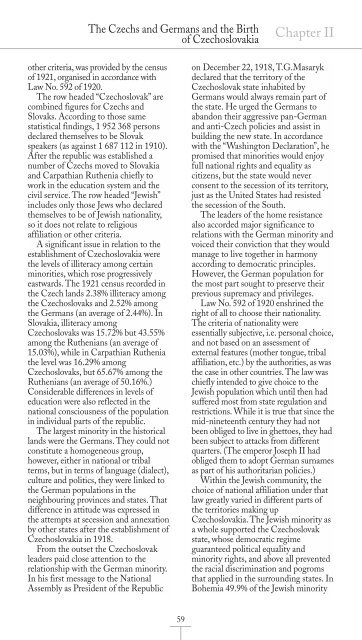the nationality of all inhabitants of the czech provinces and ...
the nationality of all inhabitants of the czech provinces and ...
the nationality of all inhabitants of the czech provinces and ...
Create successful ePaper yourself
Turn your PDF publications into a flip-book with our unique Google optimized e-Paper software.
The Czechs <strong>and</strong> Germans <strong>and</strong> <strong>the</strong> Birth<br />
<strong>of</strong> Czechoslovakia<br />
o<strong>the</strong>r criteria, was provided by <strong>the</strong> census<br />
<strong>of</strong> 1921, organised in accordance with<br />
Law No. 592 <strong>of</strong> 1920.<br />
The row headed “Czechoslovak” are<br />
combined figures for Czechs <strong>and</strong><br />
Slovaks. According to those same<br />
statistical findings, 1 952 368 persons<br />
declared <strong>the</strong>mselves to be Slovak<br />
speakers (as against 1 687 112 in 1910).<br />
After <strong>the</strong> republic was established a<br />
number <strong>of</strong> Czechs moved to Slovakia<br />
<strong>and</strong> Carpathian Ru<strong>the</strong>nia chiefly to<br />
work in <strong>the</strong> education system <strong>and</strong> <strong>the</strong><br />
civil service. The row headed “Jewish”<br />
includes only those Jews who declared<br />
<strong>the</strong>mselves to be <strong>of</strong> Jewish <strong>nationality</strong>,<br />
so it does not relate to religious<br />
affiliation or o<strong>the</strong>r criteria.<br />
A significant issue in relation to <strong>the</strong><br />
establishment <strong>of</strong> Czechoslovakia were<br />
<strong>the</strong> levels <strong>of</strong> illiteracy among certain<br />
minorities, which rose progressively<br />
eastwards. The 1921 census recorded in<br />
<strong>the</strong> Czech l<strong>and</strong>s 2.38% illiteracy among<br />
<strong>the</strong> Czechoslovaks <strong>and</strong> 2.52% among<br />
<strong>the</strong> Germans (an average <strong>of</strong> 2.44%). In<br />
Slovakia, illiteracy among<br />
Czechoslovaks was 15.72% but 43.55%<br />
among <strong>the</strong> Ru<strong>the</strong>nians (an average <strong>of</strong><br />
15.03%), while in Carpathian Ru<strong>the</strong>nia<br />
<strong>the</strong> level was 16.29% among<br />
Czechoslovaks, but 65.67% among <strong>the</strong><br />
Ru<strong>the</strong>nians (an average <strong>of</strong> 50.16%.)<br />
Considerable differences in levels <strong>of</strong><br />
education were also reflected in <strong>the</strong><br />
national consciousness <strong>of</strong> <strong>the</strong> population<br />
in individual parts <strong>of</strong> <strong>the</strong> republic.<br />
The largest minority in <strong>the</strong> historical<br />
l<strong>and</strong>s were <strong>the</strong> Germans. They could not<br />
constitute a homogeneous group,<br />
however, ei<strong>the</strong>r in national or tribal<br />
terms, but in terms <strong>of</strong> language (dialect),<br />
culture <strong>and</strong> politics, <strong>the</strong>y were linked to<br />
<strong>the</strong> German populations in <strong>the</strong><br />
neighbouring <strong>provinces</strong> <strong>and</strong> states. That<br />
difference in attitude was expressed in<br />
<strong>the</strong> attempts at secession <strong>and</strong> annexation<br />
by o<strong>the</strong>r states after <strong>the</strong> establishment <strong>of</strong><br />
Czechoslovakia in 1918.<br />
From <strong>the</strong> outset <strong>the</strong> Czechoslovak<br />
leaders paid close attention to <strong>the</strong><br />
relationship with <strong>the</strong> German minority.<br />
In his first message to <strong>the</strong> National<br />
Assembly as President <strong>of</strong> <strong>the</strong> Republic<br />
59<br />
Chapter II<br />
on December 22, 1918, T.G.Masaryk<br />
declared that <strong>the</strong> territory <strong>of</strong> <strong>the</strong><br />
Czechoslovak state inhabited by<br />
Germans would always remain part <strong>of</strong><br />
<strong>the</strong> state. He urged <strong>the</strong> Germans to<br />
ab<strong>and</strong>on <strong>the</strong>ir aggressive pan-German<br />
<strong>and</strong> anti-Czech policies <strong>and</strong> assist in<br />
building <strong>the</strong> new state. In accordance<br />
with <strong>the</strong> “Washington Declaration”, he<br />
promised that minorities would enjoy<br />
full national rights <strong>and</strong> equality as<br />
citizens, but <strong>the</strong> state would never<br />
consent to <strong>the</strong> secession <strong>of</strong> its territory,<br />
just as <strong>the</strong> United States had resisted<br />
<strong>the</strong> secession <strong>of</strong> <strong>the</strong> South.<br />
The leaders <strong>of</strong> <strong>the</strong> home resistance<br />
also accorded major significance to<br />
relations with <strong>the</strong> German minority <strong>and</strong><br />
voiced <strong>the</strong>ir conviction that <strong>the</strong>y would<br />
manage to live toge<strong>the</strong>r in harmony<br />
according to democratic principles.<br />
However, <strong>the</strong> German population for<br />
<strong>the</strong> most part sought to preserve <strong>the</strong>ir<br />
previous supremacy <strong>and</strong> privileges.<br />
Law No. 592 <strong>of</strong> 1920 enshrined <strong>the</strong><br />
right <strong>of</strong> <strong>all</strong> to choose <strong>the</strong>ir <strong>nationality</strong>.<br />
The criteria <strong>of</strong> <strong>nationality</strong> were<br />
essenti<strong>all</strong>y subjective, i.e. personal choice,<br />
<strong>and</strong> not based on an assessment <strong>of</strong><br />
external features (mo<strong>the</strong>r tongue, tribal<br />
affiliation, etc.) by <strong>the</strong> authorities, as was<br />
<strong>the</strong> case in o<strong>the</strong>r countries. The law was<br />
chiefly intended to give choice to <strong>the</strong><br />
Jewish population which until <strong>the</strong>n had<br />
suffered most from state regulation <strong>and</strong><br />
restrictions. While it is true that since <strong>the</strong><br />
mid-nineteenth century <strong>the</strong>y had not<br />
been obliged to live in ghettoes, <strong>the</strong>y had<br />
been subject to attacks from different<br />
quarters. (The emperor Joseph II had<br />
obliged <strong>the</strong>m to adopt German surnames<br />
as part <strong>of</strong> his authoritarian policies.)<br />
Within <strong>the</strong> Jewish community, <strong>the</strong><br />
choice <strong>of</strong> national affiliation under that<br />
law greatly varied in different parts <strong>of</strong><br />
<strong>the</strong> territories making up<br />
Czechoslovakia. The Jewish minority as<br />
a whole supported <strong>the</strong> Czechoslovak<br />
state, whose democratic regime<br />
guaranteed political equality <strong>and</strong><br />
minority rights, <strong>and</strong> above <strong>all</strong> prevented<br />
<strong>the</strong> racial discrimination <strong>and</strong> pogroms<br />
that applied in <strong>the</strong> surrounding states. In<br />
Bohemia 49.9% <strong>of</strong> <strong>the</strong> Jewish minority


